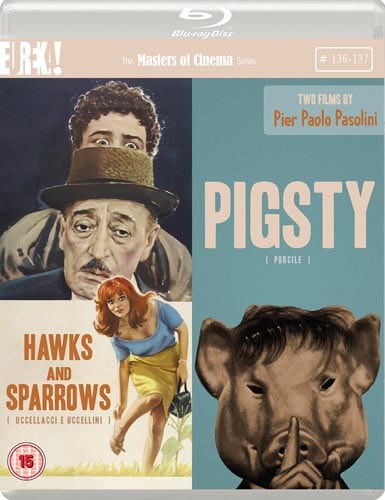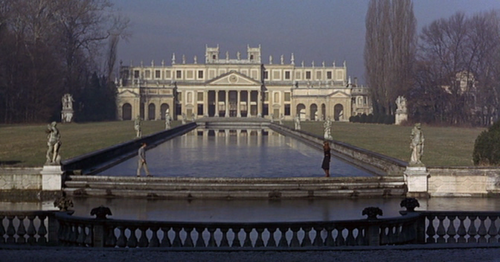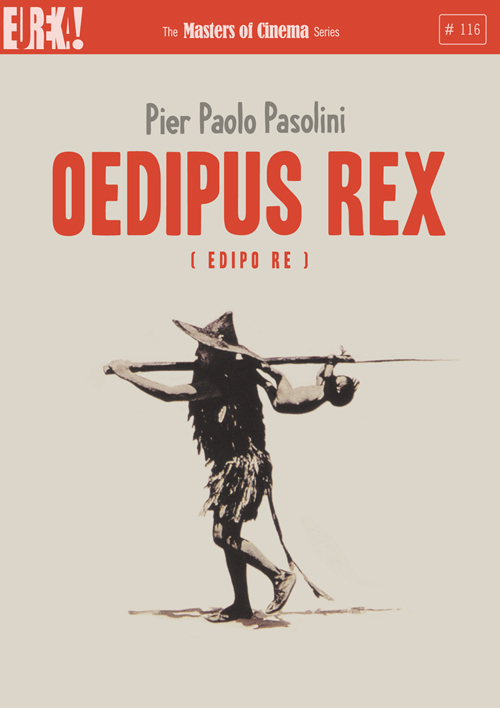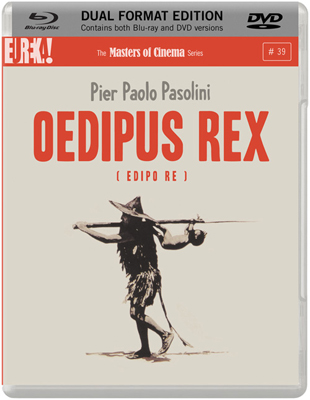Pigsty (1969)
Directed by: Pier Paolo Pasolini
Written by: Pier Paolo Pasolini
Starring: Alberto Lionello, Jean-Pierre Leaud, Pierre Clementi, Ugo Tognazzi
Italy
AKA PORCILE
AVAILABLE ON BLU-RAY: 22nd February, from EUREKA ENTERTAINMENT
RUNNING TIME: 99 min
REVIEWED BY: Dr Lenera, Official HCF Critic
Two parallel stories which alternate with each other. In one, a young man wanders in a volcanic landscape sometime in the past. He’s very hungry, and a butterfly and a snake refuse to satisfy his hunger. When he encounters a soldier, he fights and kills him, after which he eats him. Now a cannibal, he teams up with a thug to ravage the countryside. In the other story, set in 1960’s Germany, Mr Klotz is a German industrialist burdened with a son, Julian, who is less and less interested in spending time with his fiancée Ida and seems very distant and preoccupied. He confesses to Ida that he has a terrible secret, but can’t tell her what it is. Meanwhile his father discovers that his competitor Herdhitze is actually an old school friend and a war criminal…….
I don’t think you have to entirely understand a film to enjoy it. Sometimes it’s nice to just let it just wash all over you, to experience and not think so much. Plenty of time to think later, and of course plenty of time to revisit too. Pigsty is a film in which I certainly didn’t ‘get’ a great deal of it, and yet I thoroughly enjoyed as a striking piece of rather experimental cinema. I say ‘experimental’, because it’s like no Hollywood movie you’ve ever seen, yet of course there are countless filmamkers who spent most of their careers experimenting and pushing the boundaries of what a ‘normal’ film could be. These days, there are a few directors like Lars Von Trier who are doing similar things, but they seem to be drowned out by the often bland normality of commercial cinema. What a wonderful time the 60’s and 70’s were, where filmmakers felt the freedom to do whatever they wanted and the results were often shown widely in picture houses throughout the world. Nowadays, it’s mainly multiplexes and your’ normal’ commercial films; I’ve lost count of the number of times I’ve wanted to see something and none of my two locals cinemas were showing it.
The third part of Pasolini’s “Mythical Cycle” which also includes Oedipus Rex, Teorema and Medea, Pigsty begins with the reading of a plaque by a narrator, the words being obscure and, to be honest, far too intellectual for the first few seconds of a film, then continues with the titles over lots of shots of pigs in a pigsty, the filthy, grunting but somewhat cute animals given rather loving close-ups. Well, it makes sense considering the title of the film I suppose, though for a long time afterwards you may wonder at its significance. The movie then proceeds to go into its two stories, and really there seems to be very little link between the two except a minor character called Marachione, played by Ninetto Davoli who was in most of Pasolini’s films and of course co-starred in Hawks And Sparrows. Does it matter that there’s little connection? Not entirely. We are so used to stories in films being connected that it’s hard for us to assimilate tales which seemingly don’t have a link. In Pigsty, the two stories are intercut with each other throughout, sometimes in brief scenes, sometimes in long ones, yet the whole thing has a strange rhythm, giving the sense that the film was put together very carefully. It’s sad to think that some versions of the film actually have some of the scenes in the wrong order!
The story set in the past is probably the most striking, and I almost wanted to see it played out without any interruption. Now I say the past, and the time seems to be the Middle Ages judging by the soldier’s uniforms, though I’m sure I noticed some modern garb, and anyway it doesn’t matter. Our two protagonists scamper over a bleak, dark wasteland which is actually Mt Etna – you can actually see it smoking – and, aided by the complete lack of dialogue, the scenes have a brilliantly primal feel, like a film made from another time, found hidden somewhere and dug up. You can almost feel the wind blowing in your face. The cinematography is by three people which include Sergio Leone’s cameramen Tonino Delli Colli and Guiseppe Ruzzollini, so you know it’s going to be good, but they outdo themselves here in depicting this nightmarish landscape of the imagination. Pigsty was controversial for its depiction of cannibalism here, especially as we are seemingly intended to sympathise with the main character [though not his companion, who also likes to rape women], though it’s shown quite discreetly, so you don’t get any Cannibal Holocaust-type stuff here. The story ends the way it probably should in predictably brutal fashion, though the violence is subtly shown – Pasolini being very good at toying with us and actually making us want to see more – and it’s the final quote, when the main guy finally speaks, that is most disturbing:
“I killed my father, I ate humans, and I quiver with joy”.
Considering the ferociousness of that tale, the modern story initially might seem a little dull by comparison, with much of it playing out in lengthy conversations, though every little scene is cleverly staged, such as the bits involving Julian and Ida. An early conversation has him sitting in a confession box while she sits in a chair outside it, while later on they are talking while on either side of a river, visually indicating to us the barrier that they set up between each other with their often meaningless words. There’s intrigue involving the gassing of Jews during the Second World War, which seemed a little unnecessary to me but does lead to a great monologue where the speaker describes what he did and the other person plays frantically on his harp while our mind conjures up the images. Of course this story is primarily about someone’s dark secret and it’s revealed to us gradually though considering the film’s title you’ll probably guess it anyway! It’s very depraved and you’ll be glad that Pasolini doesn’t show it to us, though I wanted to see the rather poetic, if gruesome, end to the story which is only talked about.
This second story is obviously, in part, an attack on big business and the lack of morality amongst the rich, who here are all-too-willing to sacrifice their principles. Very timely, I think. Certain elements of the story of Christ seem to also be in there too, and shown for their inconsistency and hypocrisy, which I am sure Pasolini intended! Think of how different the Jesus of the New Testament is to the God, his father, of the Old Testament, something I’ve never been able to get around, and you can easily relate it to Pigsty. The other story’s meaning is a little obscure though in part seems to be an attack on ‘normal’ social values and an illustration of humankind’s potential for destruction. The two young men in each section are quite likeable some of the time, despite their “sicknesses”. The cannibal just wants to survive, while Julian, though rather unpleasant to his fiancée, is given a very strong scene where he describes how he started to get the way he is, and you actually feel very sorry for the guy. Pasolini has great sympathy with life’s outcasts, who are possibly the way they are because of their upbringing.
Pigsty seems to contain more professional cast members than usual for a Pasolini film, so the acting is much more refined though perhaps lacks the spontaneity of some of his other work. At times Pigsty seems a bit like two separate films stuck together, but overall it’s a terrific piece of Arthouse cinema that to me actually seems to be one of Pasolini’s most accessible pictures, at least out of the four that I’ve seen, though that does not seem to be the general opinion. I don’t think that you really need to be of the thinking sort to enjoy its affecting weirdness, its stunning imagery and audacious originality. And if you’re interested in that kind of thing, see if you can notice a house that would turn up in all three Godfather films.
To my eyes, Eureka’s Blu-ray of Pigsty seemed even more of an improvement on the DVD of the film than their Hawks And Sparrows Blu-ray, especially in terms of sound, which I actually compared and is far richer. Just casual likers of the film may be content with the DVD, but if you haven’t seen either film, and want to try something completely different, why not treat yourself to Eureka’s set of both movies for the price of one?
SPECIAL FEATURES:
*High-definition transfers of both films, with uncompressed monaural soundtracks
*Optional English subtitles
*Theatrical trailers
*PLUS: A booklet featuring essays on both films by Pasquale Iannone, a 1969 interview by Oswald Stack with the director about Hawks and Sparrows; an English translation by Iannone of a 1974 interview with Pasolini discussing Totó; a 1969 note on Pigsty by Pasolini circulated at the Venice première; an extract from a 1969 interview by Gian Piero Brunetta with Pasolini; and rare archival imagery










Be the first to comment